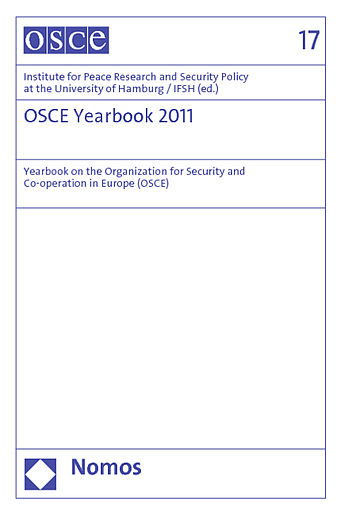englischThe OSCE Yearbook 2010 recognizes Kazakhstan’s groundbreaking Chairmanship of the Organization in a special focus section on Central Asia. Topics include Islam in the security discourse of the Central Asian states, legal reform in Central Asia, Kazakhstan’s nationalities policy, Kyrgyzstan since the “Tulip Revolution”, and relations between the state and Muslim communities in Central Asia.
2010 was also the year of the OSCE’s first Summit since 1999, and several contributions deal with the Astana Meeting of Heads of State or Government. Others discuss the Corfu Process, the proposed Treaty on European Security, and related initiatives.
The OSCE States in the spotlight in the 2010 edition are Ukraine and Slovenia. Contributions on conflict prevention and dispute settlement consider how the Corfu Process may affect the OSCE’s conflict prevention activities, and look at the situations in Georgia and Crimea.
Topics in the section on the OSCE’s three dimensions of security include election observation in longstanding democracies; post-conflict democratization in Bosnia and Herzegovina, Kosovo, and Macedonia; the difficulty of protecting freedom of the media while combating terrorism; the Bolzano/Bozen Recommendations on National Minorities; and energy security.
Further articles introduce the Collective Security Treaty Organization, consider the OSCE’s attempts to establish a mediation-support capacity, and assess the OSCE’s relations with its Mediterranean Partners for Co-operation.
The OSCE Yearbook addresses students and academics, politicians and journalists, and the interested general public.
Das OSCE Yearbook 2010 würdigt Kasachstans OSZE-Vorsitz mit einem Themenschwerpunkt „Zentralasien“. Zu den hier behandelten Themen gehören u.a. die Rolle des Islam im Sicherheitsdiskurs der zentralasiatischen Staaten, Rechtsreformen, Kasachstans Nationalitätenpolitik, die Entwicklungen in Kirgisistan nach der „Tulpenrevolution“ und das Verhältnis zwischen Staat und muslimischer Gemeinschaft.
2010 fand das erste OSZE-Gipfeltreffen der Staats- und Regierungschefs der 56 Teilnehmerstaaten seit 1999 statt, dem mehrere Beiträge gewidmet sind. Im selben Kapitel werden der Korfu-Prozess, der russische Vorschlag für einen europäischen Sicherheitsvertrag und andere Konzepte zur europäischen Sicherheit ausführlich diskutiert.
Im Mittelpunkt der Länderanalysen stehen in diesem Jahr Slowenien und die Ukraine. Beiträge zur Konfliktprävention und Streitschlichtung befassen sich mit den Auswirkungen des Korfu-Prozesses auf die Konfliktverhütungsmaßnahmen der OSZE sowie mit der Schließung der OSZE-Mission in Georgien und Konfliktpotenzialen auf der Halbinsel Krim.
Wahlbeobachtung in „etablierten Demokratien“, die Erfolgsaussichten externer Demokratisierungsmaßnahmen nach Konflikten, den Schutz der Medienfreiheit bei der Terrorismusbekämpfung, die Bolzano/Bozen-Empfehlungen zu nationalen Minderheiten in zwischenstaatlichen Beziehungen sowie Energiesicherheit sind die Themen im Kapitel über die drei Dimensionen der Sicherheit.
Weitere Beiträge befassen sich mit der Organisation des Vertrags über kollektive Sicherheit und den Beziehungen der OSZE zu ihren Kooperationspartnern im Mittelmeerraum.
Das OSZE-Jahrbuch wendet sich an Studierende und Wissenschaftler ebenso wie an die interessierte Öffentlichkeit, Politiker und Journalisten im In- und Ausland.


